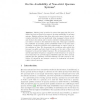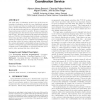37 search results - page 6 / 8 » Tolerating Byzantine Faulty Clients in a Quorum System |
SIAMCOMP
2010
13 years 3 months ago
2010
We study efficient and robust implementations of an atomic read-write data structure over an asynchronous distributed message-passing system made of reader and writer processes, as...
WDAG
2005
Springer
14 years 2 months ago
2005
Springer
Abstract. Allowing read operations to return stale data with low probability has been proposed as a means to increase availability in quorums systems. Existing solutions that allow...
EUROSYS
2008
ACM
14 years 6 months ago
2008
ACM
The tuple space coordination model is one of the most interesting coordination models for open distributed systems due to its space and time decoupling and its synchronization pow...
SRDS
2010
IEEE
13 years 6 months ago
2010
IEEE
We address the problem of providing transparent, lightweight, fault-tolerance mechanisms for generic peer-to-peer middleware systems. The main idea is to use the peer-to-peer overl...
PODC
2012
ACM
11 years 11 months ago
2012
ACM
The goal of Byzantine Broadcast (BB) is to allow a set of fault-free nodes to agree on information that a source node wants to broadcast to them, in the presence of Byzantine faul...



